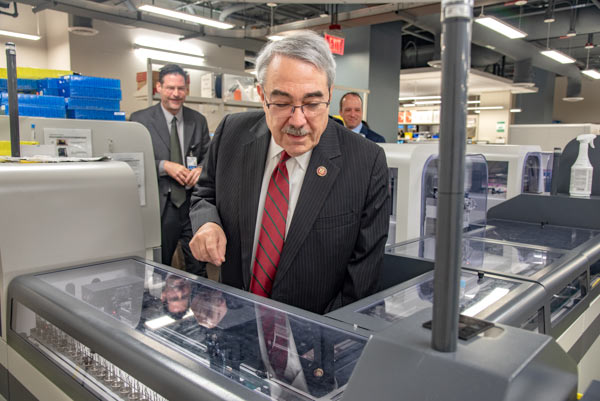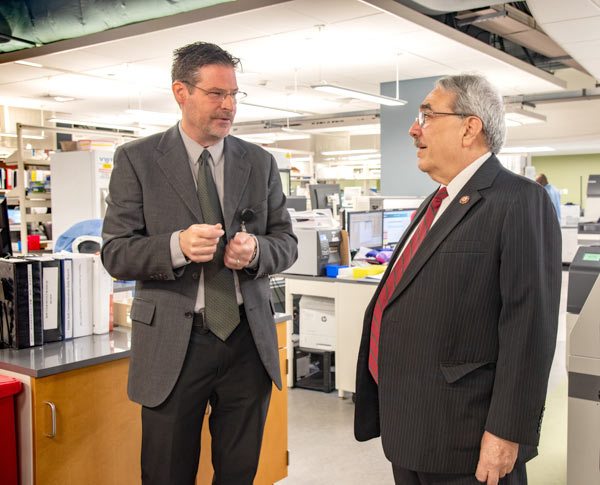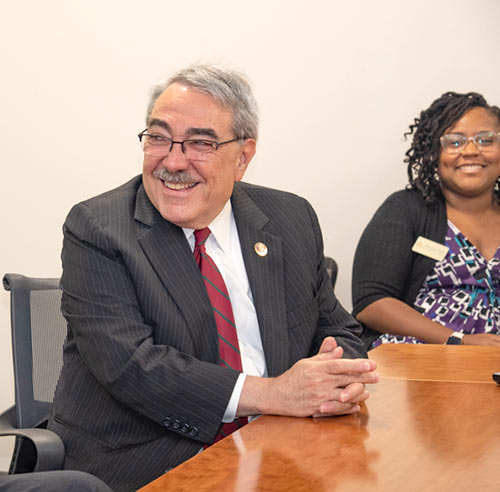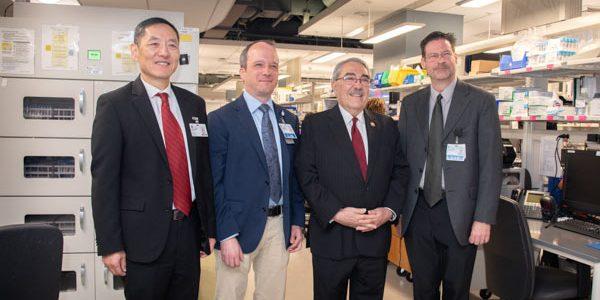
Keeping our congressional representatives up to date with our operations here at Duke is summarized by Associate Vice President and Medical Director Mike Datto. We tagged along to create some photos to document the September 30th visit with our special guest and include them with Dr. Datto’s post below:
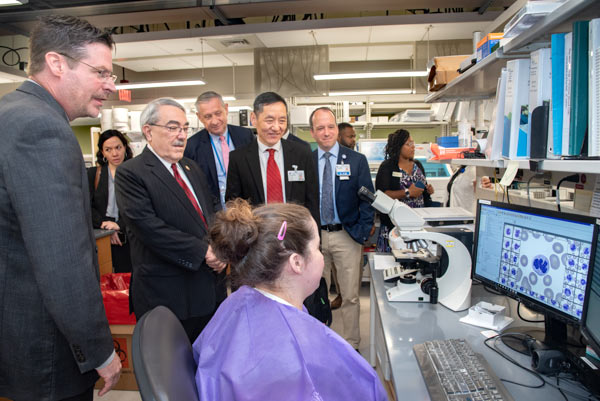
Last week, Congressman G.K. Butterfield (our NC representative for District #1 which includes Durham, Duke and the eastern part of NC) visited our laboratories. The visit was brief, lasting only 45 minutes, but I think we were successful in explaining our views on a few of the most important issues facing our laboratories that are being considered now by Congress. I’m going to summarize these issues a bit below. They may seem a bit dry, perhaps even boring… but it is important for our laboratories to lead not only in quality and safety, but also in helping to shape policies that allow us to do the amazing things that we do every day. My thanks to those of you who chatted with Rep. Butterfield or helped prep for this visit. I think he really enjoyed his time in our labs. Now for the summary of issues:
Reimbursement for Clinical Testing: This past year, our reimbursement rates from the Center for Medicare and Medicaid Services (CMS) for some of our highest volume tests were cut by up to 10%. Further cuts are scheduled over the next two years (10% each year). These cuts were based on cost reporting from large industry based laboratories. We invited Rep. Butterfield so he could see that the demands on our Duke laboratories are very different than the demands on a large commercial laboratory. Working in a hospital means that we take care of the sickest patients requiring the most complex lab tests and result in the most abnormal lab values. We have tens of thousands of critical results each year. Each one is personally delivered by one of you to the provider caring for the patient (within 30 minutes). We have TAT requirements that are measured in minutes not hours or days. On top of all of this, we train the next generation of technologists, scientists and pathologists. These differences, and others too numerous to mention here, make it a bit more expensive to run our labs. If we base our Duke reimbursement on a lab like LabCorp, we are not taking these unique aspects of hospital based care into consideration. In short, we asked Rep. Butterfield to consider the workflows and demands on the academic medical center laboratory when setting reimbursement rates. We also asked for Congress to consider holding off on further cuts until an analysis has been completed. Duke and other centers are aggregating data on cost of laboratory testing now for submission to CMS.
Regulation of Laboratory Developed Testing: Laboratory developed testing is, once again, under scrutiny. The VALID act is a draft bill describing a role for the FDA in regulating LDTs. This is the latest in a long line of proposed regulations for LDTs. These additional regulatory requirements are on top of the new requirement for labs from CMS (through Palmetto) to submit ‘technical assessments’ of next generation sequencing tests in order to get paid. The regulations are confusing and, at their worst, have the potential to make it difficult to offer LDTs at Duke. We stated our view that the regulation of LDTs could provide benefit. However, this regulation should be through a single government entity (not through CMS and the FDA both). Also, the government should provide value (as they do with PT testing programs) not just more rules. Finally, we offered Duke as a resource when considering further regulation of LDTs. We have a lot of smart analytical specialists, directors, and staff who would have to live with any new regulations. Understanding the cause and effect of proposed new regulations is something that Rep. Butterfield was interested in discussing more.
Surprise Billing: When a patient gets tested for something that is not covered by their insurance because the performing laboratory is ‘out of network’, they sometimes get a big bill that they weren’t expecting (ie. a surprise bill). This can be very stressful for patients at a time when the last thing they need is more stress. There are some tests that are so expensive that this could be financially devastating. It is not easy to fix this problem. However, we need to make sure that any fix benefits our patients first and is not a means for an insurance company to simply make more money at the expense of patients and health care providers. We can do that by ensuring that the right arbitration systems exist for our laboratories and health care providers to work with insurance companies to make sure the patients get the care that they need. Of course, while these things are being worked out, Duke has charitable and compassionate care programs to help protect our patients from crippling financial debt for the care they receive here.
Kudos to any of you who made it here! That was some dense reading. However, if you are interested in learning more about health care policy, there are ways to get involved through our professional societies. We also have some national experts here at Duke that you could reach out to (including Dr. Cardona who was recognized last year for her hard work and expertise in this area by the CAP).
Finally, it always makes me proud to show off our laboratories and talk about that work you do every day caring for our patients, their loved ones and each other.
-Mike Datto. MD PhD
Associate Professor and Vice Chair of Clinical Pathology, Department of Pathology, DUMC
Associate Vice President and Medical Director, DUHS Clinical Laboratories
